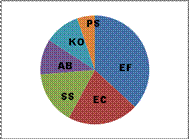 |
|||||||
|
|
|||||||
 |
|||||||
|
|
[Abstract] [PDF] [HTML] [Linked References]
Bacterial Isolates Associated with Semen of Primary Infertile Patients
S. T. Khan1, Shubhangi Deshmane2, J. N. Muneshwar3 1Professor, 2Junior Resident-III, 3Associate Professor Department of Physiology, Government Medical College, Aurangabad, Maharashtra, INDIA. Corresponding Address: Research Article
Abstract: Background and Objective: Symptomatic or asymptomatic bacterial infection of male genitourinary tract is regarded as one of the contributing factors for male infertility. The present study was conducted to assess the bacterial isolates from subjects with oligospermia coming to the reproductive biology laboratory of our hospital for evaluation related to primary infertility. Methods: Fifty subjects in the age group of 25 to 45 years visiting the reproductive biology laboratory and on semen analysis having oligospermia (sperm count less than 20 million/ml) were enrolled. The semen sample was evaluated for bacterial growth in the Microbiology Department using standard bacterial culture techniques. Results: Among the 50 samples analyzed, 19 samples were positive for bacterial growth. Seven samples were positive for E. faecalis while four were positive for E. coli. The other microorganisms isolated were Acnietobactor baumanni in two samples, Klebsiella oxytoca in two samples, coagulase negative staphylococcus in three samples and Pseudomonas aeruginosa in one sample. Conclusions: Semen samples of subjects with oligospermia were positive for presence of bacterial isolates in 38% cases with E. faecalis and E. coli being the more common bacteria isolated from the samples. Keywords: Semen analysis, Bacteriospermia, sperm count. Introduction Male urogenital tract Infection is one of the important causes of male infertility worldwide. Genital tract infection and inflammation has been associated with 8-35% of infertility cases. Male accessory sex glands infection is a major risk factor in infertility.1 Several studies suggest that one or more microbial agents in the genitourinary tract may be associated with male infertility. Microbiology investigation in infertile couple can be helpful in detecting male urogenital tract infection and its treatment. Presence of pathogenic microorganisms in semen may be related to a breach in the integrity of the blood-testes barrier and serve as early warning signals of impairment of male fertility.2 Along with the routine semen analysis parameters, microbiology study of semen can be an asset in dealing with primary infertility. This study was aimed at investigating the presence of bacterial isolates from male subjects of primary infertility.
Materials and Method The study was conducted in Reproductive Biology Unit of Physiology Department and Department of Microbiology, Government Medical College, Aurangabad. The study protocol was approved by the institutional ethical committee (IEC). A written informed consent was obtained from each subject. Study Design: An observational study. Selection of Patients: 50 subjects of primary infertility in the age group of 25- 45 years, having sperm count less than 20 million were enrolled for the study. Subjects who have taken any antibiotic in the last one week were excluded. Collection of Samples: The semen samples were collected from subjects who have had 3 to 7 days of sexual abstinence from intercourse, using the masturbation method into sterile containers. Semen samples were rapidly transferred to Microbiology Laboratory. Culture of seminal fluid samples was done under all precautions within 1 hour of sample collection. The seminal fluid was cultured using Blood Agar and McConkey Agar at 37°C for 24 h. The cultures were examined for growth. The isolation and identification of bacterial isolates were carried out as per standard operating procedure.3 Results 50 samples were processed among which culture was positive in 19 cases. The growth was found of coagulase negative staphylococcus, Acnietobactor baumanni, Klebseilla oxytoca, E. coli, E. faecalis, Pseudomonas aeruginosa.
Figure 1: Pie diagram showing number of organism found in semen. EF- E. faecalis: (7/19) EC- E. coli: (4/19) SS- coagulase negative staphylococcus: (3/19) AB-Acnietobactor baumanni: (2/19) KO- Klebsiella oxytoca: (2/19) PS- Pseudomonas aeruginosa: (1/19) Discussion In our study, 19 out of the 50 semen samples were found to be positive for presence of bacterial isolates. Seminal infection can act as the reservoir of infection and could cause chronic urinary tract infection. The male reproductive tract is essentially a sterile zone except the lower urethra that may contain a few commensals of the skin. Microorganisms are commonly found in insignificant quantities in the semen of asymptomatic men. If the presence of micro-organisms in the semen is associated with infertility the numbers of organisms must be high for an effect to be seen.3 In our study the most common pathogens isolated were E. Faecalis, followed by E. coli. The infection of the male genital tract may affect seminal quality through a direct action on spermatozoa or their environment, including local inflammatory reaction and composition of seminal plasma 4. It may cause infertility by adversely affecting sperm function, damaging sperm, hampering their motility, altering the chemical composition of the seminal fluid, and causing anatomical obstruction. The bacteria are known to cause urethritis which is often complicated by infections of other parts of the genital tract, including the testes. Breach of blood testes barrier may contribute to male infertility.5 It is assumed that bacterial infections may stimulate the immune system and attack on sperm cell membrane with exposure of the spermatozoa to immunologically competent cells in inflammatory conditions. This infection may cause occlusion in the canalicular system of male genital tract, may damage the epithelial cells involved in the spermatogenesis. This might be the cause of low sperm count in these cases. 2 Conclusion Semen samples of subjects with oligospermia were positive for presence of bacterial isolates in 38% cases with E. faecalis and E. coli being the more common bacteria isolated from the samples. References
|
||||||
|
|||||||
